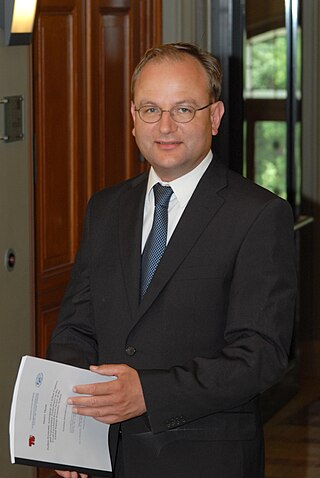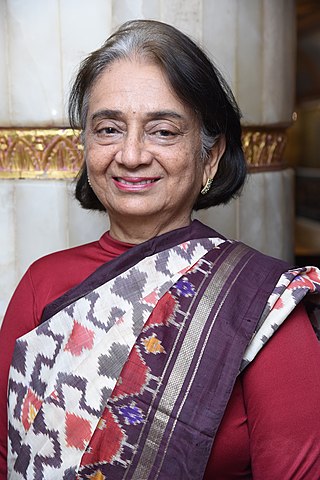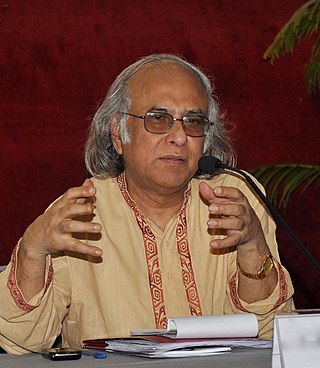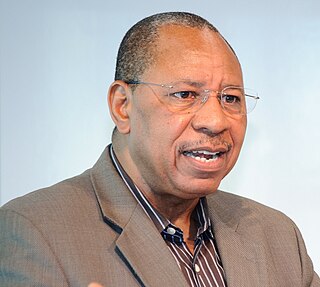Related Research Articles

Rajendra Kumar Pachauri was the chairman of the Intergovernmental Panel on Climate Change (IPCC) from 2002 to 2015, during the fourth and fifth assessment cycles. Under his leadership the IPCC was awarded the Nobel Peace Prize in 2007 and delivered the Fifth Assessment Report, the scientific foundation of the Paris Agreement. He held the post from 2002 until his resignation in February 2015 after facing multiple allegations of sexual harassment. In March 2022, he was exonerated of the sexual harassment allegations. He was succeeded by Hoesung Lee. Pachauri assumed his responsibilities as the Chief Executive of The Energy and Resources Institute in 1981 and led the institute for more than three decades and demitted office as Executive Vice Chairman of TERI in 2016. Pachauri, universally known as Patchy, was an internationally recognized voice on environmental and policy issues, and his leadership of the IPCC contributed to the issue of human-caused climate change becoming recognized as a matter of vital global concern.
The Burtoni Award was created in 2003 by a group of leading experts and policy makers in the field of climate change. It is named for the Canadian science pioneer Ian Burton. Its purpose is to recognize outstanding contributions to the science of adaptation to climate change. The award is named after the first recipient of the award, Ian Burton, an emeritus professor at the University of Toronto and a pioneer in the field of adaptation to climate change and extreme events and disasters. Ian has contributed to three assessment reports of the IPCC and the recent Special Report on Extremes (SREX).

Ottmar Georg Edenhofer is a German economist who is regarded as one of the world's leading experts on climate change policy, environmental and energy policy, and energy economics. His work has been heavily cited. Edenhofer currently holds the professorship of the Economics of Climate Change at Technische Universität Berlin. Together with Earth scientist Johan Rockström, economist Ottmar Edenhofer is scientific director of the Potsdam Institute for Climate Impact Research (PIK), representing the interdisciplinary and solutions-oriented approach of the institute. Furthermore, he is director of the Mercator Research Institute on Global Commons and Climate Change (MCC). From 2008 to 2015 he served as one of the co-chairs of the Intergovernmental Panel on Climate Change (IPCC) Working Group III "Mitigation of Climate Change".

Saleemul Huq was a Bangladeshi-British scientist and had been the Director of the International Centre for Climate Change & Development (ICCCAD) based in Bangladesh, also Professor at Independent University, Bangladesh (IUB). He was elected one of Nature's 10 top scientists in 2022.

Carlo Carraro is the chancellor of the University of Venice for the three-year period 2009–2012, with a two-year extension of his mandate in accordance to the Gelmini University Law bringing it up to summer 2014. He is also professor of environmental economics at the same university. He is director of the Sustainable Development Programme of the Fondazione Eni Enrico Mattei and director of the Climate Impacts and Policy Division of the Euro-Mediterranean Center for Climate Change (CMCC). In 2008, Carraro was elected vice-chair of the Working Group III and member of the bureau of the Nobel Laureate Intergovernmental Panel on Climate Change (IPCC).

Jyoti Kirit Parikh is the current Executive Director of Integrated Research and Action for Development (IRADe). She was a Member of the Prime Minister’s Council on Climate Change –India and is a recipient of Nobel Peace Prize awarded To IPCC authors in 2007. She was a Senior Professor at Indira Gandhi Institute of Development Research (IGIDR), Mumbai. She also worked at the International Institute for Applied Systems Analysis (IIASA), Austria and served as a senior energy consultant at the National Institution for Transforming India (1978–80). She was a visiting professor at the Institute of Advanced Studies (IAS) of UNU, Tokyo (1995–96). She was the Acting Director of IGIDR for 1997-98. She has experience for nearly thirty years on energy and environment problems of the developing countries.

Thomas C. Heller is a climate policy lawyer and academic. He currently serves as the chairman of the board for Climate Policy Initiative, an organization he founded in 2009 that works to improve energy and land use policies, with offices and programs in Brazil, China, Europe, India, and Indonesia, and the United States.

Tan Sri Zakri bin Abdul Hamid has had a distinguished career in science as a researcher, educator, administrator and diplomat.

Qazi Kholiquzzaman Ahmad is a Bangladeshi economist and development thinker and activist. He is currently the chairman of Dhaka School of Economics (DScE), a constituent institution of the University of Dhaka, devoted to post-graduate studies in economics and related subjects. He is former chairman of Palli Karma-Sahayak Foundation (PKSF), which is largest rural development funding, skill development and management support agency in Bangladesh. He received the highest national civilian award Independence Award 2019; and Ekushe Padak 2009, presented by the Government of Bangladesh.

Lindsay C. Stringer is a Professor in Environment and Development at the University of York.

The contributions of women in climate change have received increasing attention in the early 21st century. Feedback from women and the issues faced by women have been described as "imperative" by the United Nations and "critical" by the Population Reference Bureau. A report by the World Health Organization concluded that incorporating gender-based analysis would "provide more effective climate change mitigation and adaptation."

Sir James Ferguson "Jim" Skea CBE FRSE is a British academic. He is currently Chair of the Intergovernmental Panel on Climate Change (IPCC) for its seventh assessment cycle, and a Professor of Sustainable Energy at Imperial College London. Before being elected as chair, Skea was co-chair of Working Group III of the IPCC. He was a founding member of the UK Government's Committee on Climate Change and currently chairs Scotland's Just Transition Commission. He was a co-author of the IPCC 2018 Special Report on Global Warming of 1.5 °C. In July 2023, Skea was elected as Chair of the IPCC.
Nebojsa Nakicenovic is an energy economist.
William R. Moomaw is the Professor Emeritus of International Environmental Policy at the Fletcher School, Tufts University. Moomaw has worked at the intersection of science and policy, advocating for international sustainable development. His activities have included being a long-time contributor to the Intergovernmental Panel on Climate Change and an author on the seminal "Perspective" paper on proforestation.

Fatima Denton is a British-Gambian climatologist. She is the director at the Ghanaian branch of the United Nations University, at the UNU Institute for Natural Resources in Africa (UNU-INRA) in Accra. She focuses on innovation, science, technology and natural resource management. She partners with countries such as Benin and Liberia to develop and implement country needs assessment missions.
Sérgio Campos Trindade was a Brazilian chemical engineer and researcher, specialist in renewable energies and consultant in sustainable business. Trindade was the coordinating lead author for a chapter of an Intergovernmental Panel on Climate Change (IPCC) report, Methodological and Technical Issues in Technology Transfer (2000); the IPCC as an organization won the 2007 Nobel Peace Prize as a result of its contributors' work.

Opha Pauline Dube is a Botswanan environmental scientist and Associate Professor in the Department of Environmental Science at the University of Botswana. She co-authored the IPCC's Special Report on Global Warming of 1.5 °C. She is one of fifteen scientists creating the 2023 Global Sustainable Development Report for the United Nations.
Joyashree Roy is an Indian economist with specialization in the fields of Environmental economics, energy economics and Climate change mitigation.

Sangwon Suh is an American industrial ecologist.

Youba SokonaFAAS FTWAS (born 23 May 1950) is a Malian expert in the fields of energy and sustainable development, particularly in Africa. He has been the vice-chair of the Intergovernmental Panel on Climate Change (IPCC) since October 2015 and a lead author at the IPCC since 1990.
References
- ↑ The Nobel Peace Prize for 2007
- ↑ Munasinghe Institute for Development
- ↑ SLEMA
- ↑ articles
- ↑ Sustainomics framework
- ↑ Millennium Consumption Goals
- ↑ "Archived copy" (PDF). Archived from the original (PDF) on 25 July 2019. Retrieved 25 July 2019.
{{cite web}}: CS1 maint: archived copy as title (link) - ↑ "Professor Mohan Munasinghe - Intelligence Squared". www.intelligencesquared.com. Archived from the original on 20 July 2011.
- ↑ "Delhi Sustainable Development Summit 2003".